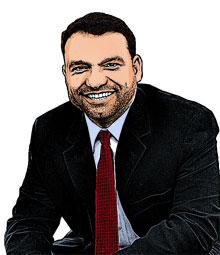
FELIX ARROYO |
Boston city councilors enjoy relatively high political profiles, but in reality they labor under the tight constraints of a strong-mayor system. In the past, this paradox has often reduced the council to an echo chamber, where talk has been more plentiful than ideas. The past two years, however, have been constructive, even fruitful.There are seven candidates vying for four at-large council seats in the November 8 municipal elections. The Phoenix endorses four incumbents, listed here in alphabetical order:
FELIX ARROYO, the council's sole Latino member, is a one-term incumbent who has successfully negotiated the switch from his previous job as a labor organizer to public servant.
Impressive on a number of fronts, Arroyo has developed an admirable economic-policy plan that in these challenging times could yield impressive results, if only Mayor Thomas Menino would get behind it.
Called Invest in Boston, Arroyo's plan would leverage the $1 billion in deposits that the city places in local banks. Arroyo's idea is to invest in banks that invest in Boston and reward those banks that make loans for local business development with city deposits.
In this punishing economic environment, Invest in Boston would not only help create jobs and promote growth — if used properly, it could help reduce housing foreclosures and promote lending to qualified home buyers.

JOHN CONNOLLY |
JOHN CONNOLLY, a former teacher and lawyer, has completed two council terms. Like Arroyo, Connolly is frequently mentioned as a potential mayoral candidate and is perhaps the council's most recognized member.Although the council has only limited school oversight, restricted largely to budgetary matters, Connolly has shown imagination in using his perch as chairman of the Education Committee as a bully pulpit to advocate for responsible reform and concrete improvements.
Connolly showed real guts in going public with the news that Boston Public Schools routinely served students cafeteria food that was past its expiration date.
More impressive and important was the daylong hearing Connolly convened last year to establish what needs to be done to move the public schools forward. At the time, the Phoenix noted: "For almost eight consecutive hours, scores of students, parents, outside experts, grassroots leaders, business representatives, and established civic bigwigs made clear-cut and common-sense-based recommendations on how to improve what already works in the schools and how to fix what has, until now, appeared beyond repair."